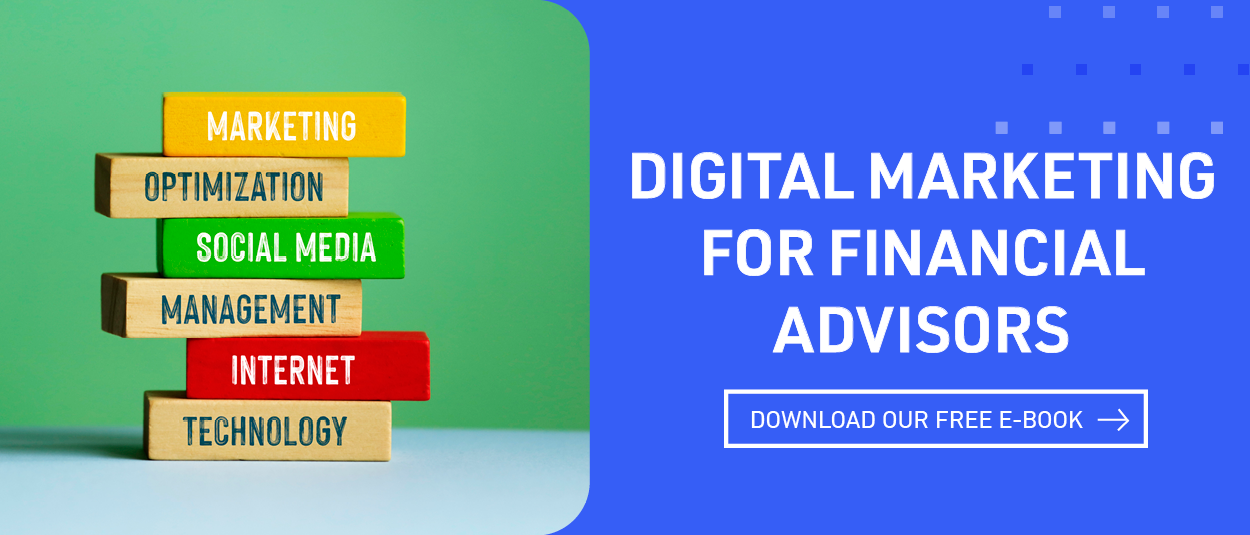

More Financial Advisors Embrace Virtual Marketing Strategies (It’s Not Just Covid)
Let’s start with three definitions that define three overlapping financial advisor marketing strategies.
- Digital marketing describes the services that financial advisors use when they market their firms and services over the Internet.
- Inbound marketing is a subset of digital marketing services that includes content marketing, social media, and local SEO. This is the process that financial advisors use to build online visibility and website traffic. Investors initiate the contact after finding advisors on the Internet. This is the opposite of outbound marketing when financial advisors have to initiate contact with investors who may not want the contact (high rejection rates).
- Virtual marketing describes the way financial advisors interact with prospects for their advice and services. There is no face-to-face contact in the virtual world. Contact is limited to telephone and Internet.
During Covid, investors and financial advisors have not had a choice. Both parties are going to require social distancing and masks. After Covid, there still may not be a choice. Prospects and clients may have learned to prefer virtual interactions because they are more convenient and efficient.
Very little is gained in face-to-face interactions. It is simply the way of communicating in the past and it is rapidly becoming obsolete.
Clients Versus Prospects (Virtual)
Every financial advisor in America has virtual relationships with investors. This is true because every advisor has had clients relocate to distant cities and retain their services. This is a no-brainer because virtual relationships were established after the investors selected the financial advisors. And, the virtual connections were based on successful business relationships.
Although the client/advisor type of virtual interaction is a good experience, it is not the type of communication that is the topic of this article. We are describing virtual interactions with “leads” and “prospects” and not clients. By definition, these investors have not made their selection decisions. In fact, they most likely have not determined who they even want to interview.
So the strategy in this article relates to financial advisors who use virtual strategies to interact with leads and prospects.
Local Competition
There is no question that investors are used to traditional (face-to-face) interactions with their financial advisors. Face-to-face has also been the primary type of interaction when investors select financial advisors. For this reason, most advisors are more comfortable using traditional marketing methods when they sell financial advice and services.
In recent times, we believe there is a bigger issue. What happens when a virtual financial advisor goes up against a financial advisor who is using traditional, face-to-face marketing methods. Does the traditional advisor have a competitive advantage and how does the virtual advisor overcome it?
You might think the traditional financial advisor has a tremendous competitive advantage. That might not be true if the virtual advisor is prepared to describe the benefits of virtual relationships.
Every virtual advisor should have five primary benefits why investors are better off in a virtual relationship. It starts with investors making better decisions when they select financial advisors (hint: their decisions are more objective).
The Internet is Beginning to Impact the Financial Service Industry
Investors are just beginning to learn how much online information there is about financial advisors and it is just the tip of a very large iceberg.
As more investors learn how easy it is to find and research advisors on the Internet they will also find it increasingly convenient to interview them online.
Covid Impacts Financial Advisor Communications
There is no question Covid has had a major impact on people’s use of the Internet. Masks and social distancing are just symptoms of an old established way of communicating that is rapidly becoming obsolete and covid is the catalyst to make that happen.
There is also no question Covid has had a tremendous impact on financial advisor interactions with all investors, regardless of age or circumstance. And, the older the investor, the higher the probability they will be cautious in their interactions with their financial advisors. This is noteworthy because they also control a disproportionate amount of the country’s net worth.
The question is what happens after the post-covid period and the health risk is reduced to no more than the common flu?
A significant percentage of financial advisors believe virtual marketing is here to stay as more investors get used to virtual communications using Zoom, Webex, and GoToMeeting.
It is just too convenient and efficient to believe it is just a temporary reaction to Covid. All of these services existed before Covid. But, there is no question, Covid has accelerated their adoption rates. Even reluctant users are jumping on board.
Investors Make a Choice
How does this reality impact financial advisors? They will have to offer investors choices for how they will interact before and after the sale. The choice could be as simple as face-to-face or virtual communications.
Let’s focus on the marketing of financial advice and services.
Advisors have to refine their marketing strategies so they are equally effective in virtual and traditional situations. For example, advisors may rely more on their sales and relationship skills when marketing in traditional situations.
On the other hand, they may want more visual aids and collateral materials when marketing in virtual situations. That’s because investors retain more of what they see and hear. This is more important in virtual situations when sales and relationship skills are diluted.
How Investors Benefit
There are five primary benefits when investors conduct virtual interviews for selecting financial advisors.
A major variable that impacts benefits is where the meetings occur: The advisor offices (most of the time), the investor homes/offices (less often), or a neutral location like a restaurant (sometimes, lack of privacy).
We are going to assume the face-to-face meetings occur in the advisors’ offices. Virtual meetings are using Zoom.
- Time: The investor does not have to spend time traveling to and from advisor offices. Meetings are shorter because advisors may be more inclined to get to the point.
- Expense: There is an expense associated with travel. It can be automotive expense, parking, and/or the value of the investor’s time.
- Objectivity: Investors make better decisions when they see and hear information. Advisor sales and relationship skills have less of an impact in virtual meetings.
- Record: There is a written record if there is a future dispute. Investors do not win disputes when there is no written record.
- Convenience: Due to the above benefits, virtual interactions are more convenient. They can be scheduled at any time. Rush hour traffic is no longer an issue.

Jack Waymire, BA, MBA
Search Here
Categories
- AI (18)
- blogging (2)
- branding (1)
- content (12)
- custodians (1)
- Digital (535)
- email marketing (3)
- fcmo (3)
- fees (1)
- financial advisor marketing (66)
- Google (3)
- Ideas & Tips (125)
- Investor Experience (7)
- lead generation (7)
- linkedin (1)
- Marketing (605)
- newsletters (1)
- Online Transparency (2)
- podcasting (1)
- search engine optimization (4)
- seo (9)
- Social Media (2)
- video (3)
- Websites (172)
- YouTube channel (2)
Recent Posts
-
 October 22, 2025
October 22, 2025 -

-

Top 10 Business Challenges for Smaller Financial Advisor Firms
October 16, 2025 -

How Financial Advisors Use AI to Optimize Website Compliance
October 14, 2025 -

AI Blogging On Your Financial Advisor Website
October 10, 2025

